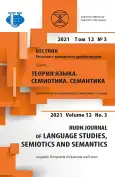Morphological Peculiarities of Lexical Units of English Origin in Contemporary Russian Slang: Dictionary and Corpus Analyses
- Authors: Lacková M.1
-
Affiliations:
- University of Zilina
- Issue: Vol 12, No 3 (2021): Linguistic dominants of grammar and lexics
- Pages: 632-651
- Section: FUNCTIONAL SEMANTICS AND LINGUISTIC SEMIOTICS
- URL: https://journal-vniispk.ru/2313-2299/article/view/323356
- DOI: https://doi.org/10.22363/2313-2299-2021-12-3-632-651
- ID: 323356
Cite item
Full Text
Abstract
The paper deals with lexical units of English origin that have penetrated into contemporary Russian slang with the emphasis on their morphological features. The spread of these words in the Russian language provides a scientist with a linguistically challenging material since the English and Russian languages represent typologically diverse language systems. To begin with, the research focuses on the ratio of individual word classes within the studied material together with the representation of individual grammatical genders throughout. As nouns represent the most numerous group of the adapted lexemes, the main emphasis is put on their morphological adaptation into the Russian language, and at the same time, their most common morphological features are listed. The following traits belong to the marginal ones from the point of view of word classes: an Anglicism may be a component of several word classes and the here-studied Anglicisms only exceptionally do not keep their original categorial meanings. Additionally, they display differences in onomasiological categories across the studied field. Morphological features of Anglicisms in Russian slang are the combination of Russian and English morphological aspects of individual word classes. Furthermore, words borrowed from English acquire grammatical categories typical of their corresponding counterparts in the Russian language. As a final point, most Anglicisms in the Russian slang undergo conjugation and declination processes (98,5% of instances). The possible utilization of the research is noticeable in the areas of comparative and corpus linguistics and translatology when searching for equivalents of words in typologically different languages. What is more, its results are applicable in the methodology of teaching foreign languages. The whole linguistic material is investigated in the framework of the online dictionary of slang and the text corpus Russian Web 2011 (ruTenTen11) with the help of the search tool Sketch Engine. To reveal the complex sociolinguistic and psycholinguistic functioning of the Anglicisms in contemporary Russian slang, further research needs to be conducted.
Keywords
About the authors
Marta Lacková
University of Zilina
Author for correspondence.
Email: marta.lackova@fhv.uniza.sk
Department of English Language and Literature, Faculty of Humanities
8215/1, Univerzitna, Zilina, Slovakia, 010 01References
- Polozova, S.V. (2008). Foreign borrowings as a source of lexical-phraseological structure of contemporary Russian jargons. Proceedings of Voronezh State University. Series: Linguistics and intercultural communication, 3, 83-87. (In Russ.).
- Furdik, J. (2004). Slovenska slovotvorba. M. Oloshtiak (Ed.). Preshov: Nauka. (In Sloven.).
- Kachala, J. (1992). Slovo manazment v slovenchine. Kultura slova, 5-6, 155-159. (In Sloven.).
- Kollar, D. (2001). Suchasne trendy v preberane cudzich slov (na ruskom a slovenskom materiali). Slavica Slovaca, 2, 108-113. (In Sloven.).
- Аristova, V. М. (1978). English-Russian language contacts (anglicisms in Russian). Leningrad. (In Russ.).
- Korensky, J. (1998). Metodologicke problemy zkoumani promen souchasnych slovanskych jazyku. Jazykovedny chasopis, 1-2, 27-33. (In Sloven.).
- Korensky, J. (2003). Internacionalizace souchasnych slovanskych jazyku - moznost nebo nutnost? Jazykovedny chasopis, 1-2, 7-11. (In Sloven.).
- Furdik, J. (1993). Slovotvorna motivacia a jej jazykove funkcie. Levocha: Modry Peter. (In Sloven.).
- Ondrejovich, S. (1999). Slovenchina v kontaktoch a konfliktoch s inymi jazykmi. Bratislava: Veda. (In Sloven.).
- Mistrik, J. (1998). Lingvisticky slovnik. Bratislava. (In Sloven.).
- Vepyova, Z. (2001). Anglicizmy v slovenskej publicistike. In: Acta Facultatis Paedagogicae Universitatis Tyrnaviensis. Trnava. pp. 49-51. (In Sloven.).
- Oloshtiak, M. (2002). Transfonemizacia v kontaktovom vztahu anglichtina - slovenchina. Slovenska rech, 2, 111-126. (In Sloven.).
- Hegerova, K. (1999). Anglicizmy a internacionalizmy v technickych normach. Kultura slova, 1, 13-18. (In Sloven.).
- Horecky, J. (1998). Miesto a funkcia slova lizing (leasing) v slovencine. Kultura slova, 5, 264-268. (In Sloven.).
- Bashtinova, G. (1997). Mother Tongue Interference at the Lexical Level: An Introduction to the English-Slovak “Faux Amis”. Philologica, XLVI, 69-79.
- Habovshtiak, A. (1993). Zo slovensko-slovanskych lexikylnych vztahov. Bratislava: VEDA. (In Sloven.).
- Lackova, M., Hundarenko, O., Moskalenko, O. & Demchenko, I. (2019). Word-Formation Characteristics of Anglicisms in the Russian Slang. International Journal of English Linguistics, 9(5), 283-300. doi: 10.5539/ijel.v9n5p283
- Mala, E. (2003). Substantivne anglicizmy a ich analyza v ruskom jazyku. Banska Bystrica: UMB. (In Sloven.).
- Balaz, G. et al. (1989). Modern Russian in comparison with Slovak. Morphology. Bratislava: SPN. (In Russ.).
- Halliday, M.A.K. et al. (2004). Lexicology and Corpus Linguistics: An Introduction. London: Continuunm.
- Lelakova, E. (2018) Learning Gastronomy Vocabulary through Corpus. Zilina: EDIS.
- Orgonova, O. (1998). Galicizmy v slovencine. Bratislava. (In Sloven.).
- Kuznetsova, E.V. (1989). Lexicology of the Russian language. Moscow. (In Russ.).
- Sokolova, J., Hrckova, M., Kadorova, M. & Savcakova, N. (2005) Morfologia sucasneho ruskeho jazyka. Ucebnica a cvicebnica. Nitra.
- Crystal, D. (2005). The Cambridge Encyclopedia of the English Language. Cambridge.
- Gallo, J. (2019). Some lexical and syntactic realization of speech strategies and tactics in media discourse (on material of the Russian and Slovak press). Jazyk a kultúra, 39-40, 9-21. (In Russ.).
- Cambridge Advanced Learner’s Dictionary (2003). Cambridge.
- Gračev, М.А. (2007). Slovar sovremennogo molodežnogo žargona. Moskva.
- Rusko-český a česko-ruský slovník neologizmů (2004). Praha.
- Russko-slovackij slovar (1989). Bratislava.
- Russian Web 2011 (ruTenTen11) [Online] URL: https://app.sketchengine.eu/ (аccessed: 20.06.2020).
- Slovar sovremennogo molodežnogo slenga. (2020). [Online] URL: http://teenslang.su/ (аccessed: 20.06.2020).
Supplementary files









